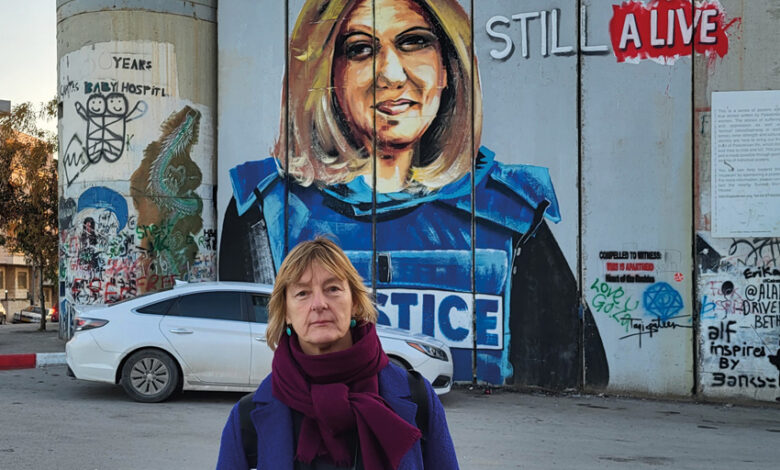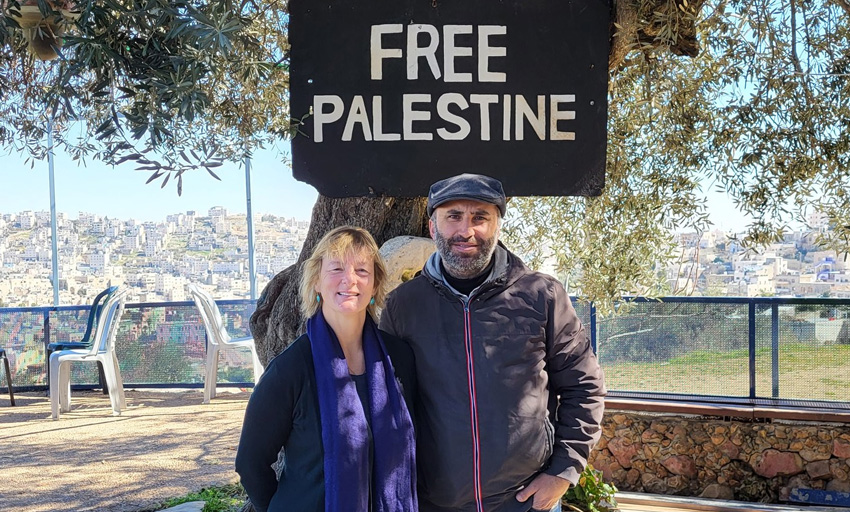Solidarity with Palestine must come with action

As the far-right surges to power in Israel and accelerates annexations of Palestinian land, Green Party MEP Grace O’Sullivan calls for civil action against what she calls growing Israeli apartheid. The MEP for the Ireland South constituency travelled to Palestine in February 2023 on a mission with the European Parliament.
For a country that describes itself as “the only democracy in the Middle East”, Israel is not a particular fan of elected representatives. Two members of the European Parliament had been banned from entering Tel Aviv before an official delegation mission to the country had even begun, when we travelled to Palestine in February 2023. The year before, in 2022, an entire delegation had been banned from travelling to Gaza, a city of two million people living in what is often described as ‘the largest open-air prison in the world’.
At the same time, the government of Israel was trying to push through draconian judicial reforms that sparked some of the largest protests of Israeli civil society in the history of the state. Prime Minister Benjamin Netanyahu was attempting to seize political control of the same courts that had hounded him for allegedly siphoning public money into his own pockets for years. In order to get the political clout to carry this out, he had allied with the far-right and had agreed to establish a new militia under the complete control of the far-right Minister for Justice, Yariv Levin. The Israeli claim to ‘democracy’, already tenuous at best, was fraying at the edges.
At the time, I was travelling with a group of MEPs from the European Parliament’s Delegation to Palestine on a mission to meet with civil society groups, NGOs, and government figures in the Occupied Territories of the West Bank. On the way to Bethlehem, the taxi driver arriving at the military checkpoint into the West Bank recalled travelling, in his childhood, to visit the birthplace of Jesus, something that he could not do now with his own children due to the nine-metre tall concrete separation wall that now dominates the landscape.
Under the current circumstances, civilians, civil society groups. and activists in the occupied West Bank are in more danger than ever before, as the government in Tel Aviv was openly calling for the annexation of Palestinian territories and the expansion of illegal settlements there. Eight respected organisations had been declared ‘terrorist groups’ and had their offices raided and doors literally welded shut. One of those organisations helped children imprisoned by the Israeli military courts. Another worked on employment for Palestinian women.

Civil servants in Palestine are caught between two broken and oppressive systems. The Israeli military and secret services keep a close eye on every Palestinian involved in government as a potential threat. Public services in the Occupied Territories are limited at best and are constantly being undermined by Israeli settlements, supported by the military. As hospitals crumble and infrastructure is constantly sabotaged by settlers, Israeli politicians use this image as ‘proof’ that Palestinians cannot be trusted to run a modern state. It is a cycle that has only deteriorated in recent years, exacerbating the apartheid approach that sees two separate systems for two peoples in one land.
Israel itself is turning a chilling corner. Once happy to keep Palestinians of the West Bank and Gaza down, Israeli politics is now turning on Israelis who do not fit the national-conservative narrative. The new far-right government has put in power religious extremist ministers, who have women and the LGBT+ community in their sights.
So far, in my time as an MEP, the European Union and its member states have proven themselves entirely unable to act against Israel’s breaches of international law. Condemnations of human rights abuses in the Occupied Territories are accompanied by increased EU investment in the Israeli economy. Following the murder of journalist Shireen Abu Akleh, a year ago almost to the day, EU leaders were quick to accept the Israeli military’s excuses.
Ireland is one of the few countries in the EU which still stands up for the Palestinian cause of statehood in international fora. When it comes to action however, our response has been lacklustre. Our discourse has remained the same as 20 years ago when there was more hope for a realistic two-state solution. Now as Israel builds its own apartheid regime, Ireland must lead the way in showing its fellow EU member states that they must stand up for the rule of law at home and abroad.
There is an urgent need for unilateral action by international actors in order to show that a response is possible. One of the concrete ways of doing that is for Ireland to put the Occupied Territories Bill, tabled by Senator Frances Black but blocked by one government party, back on the table. I believe the legislation is now even more relevant than when I co-sponsored it with a group of senators in 2018.
I have also called on the European Commission to cut funding to Israel for its destruction of Palestinian schools and institutions often built with EU funding in the first place. It has shown no willingness to respond. In the face of inaction, Ireland should be the first to turn the tide on apartheid.
Finally, civil society has a role to play in holding Israel to account. One of the primary means for bringing down apartheid in South Africa was economic pressure. Unions and workers played a significant role in shining the light on that regime’s human rights abuses. Who can forget the courageous role of Mary Manning and the Dunnes Stores workers in their boycott of South African goods?





